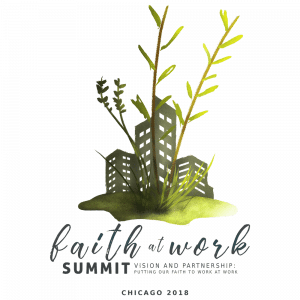Join more than 500 leaders from churches, industries, and schools—including Greg Forster—at the Faith at Work Summit, October 11 to 13 in Chicago. Participants will learn from each other and work together to extend Christ’s presence in workplaces around the world. The early bird discount ends May 31, so register soon at FWSummit.org.
The typical faith-and-work talk runs like this:
God made you with a wonderful job to do that brings meaning and purpose into your ordinary life. Every day, we have the incredible opportunity to bring the holy love of God into the life of the world around us by the way we do our daily work. We are carrying out the calling to take good care of God’s world, and to shape ourselves in ever greater Christlikeness.
And many people roll their eyes and say, “Sounds like a nice theory. You should try doing my job.”
I definitely understand why the conversation goes the way it does. We want to start with something encouraging and uplifting, not with doom and gloom. And we want to keep God, not Satan, at the center—it’s important to remember who’s really in control.
At the same time, we need to connect with people’s daily experience, talk to them about the world they actually recognize around them, and acknowledge their suffering and need.
When I speak at faith-and-work conferences, I frequently host workshops with titles like “When Work Stinks.” And you know what? I have never had an empty room.
Toil and Frustration
How does work stink? In oh so many ways, but let’s start at the beginning. Genesis 3:17–19 puts the emphasis on two primary ways the fall affects our daily work: toil and frustration.
 Toil doesn’t mean exertion. Physical work that required effort was there before the fall. Genesis 2:15 says the reason God put Adam in the garden in the first place was to work it and keep it, to cultivate it and protect it.
Toil doesn’t mean exertion. Physical work that required effort was there before the fall. Genesis 2:15 says the reason God put Adam in the garden in the first place was to work it and keep it, to cultivate it and protect it.
No, toil means pain and strain—physical suffering and fatigue. Adam’s brow will now sweat as he works, God said (Gen. 3:18), and we experience the same. As we exert ourselves in our work, we feel the fall in our bodies. We see the physical toll in the aching muscles of field laborers or construction workers, in the weary feet of factory workers, and in the extra weight or carpal tunnel of those who sit still and type in offices.
As toil is to the body, frustration is to the soul. After the fall, the garden produced not only crops and flowers, but also thorns and thistles (Gen. 3:19). We experience this frustration in two ways. In the short term, any task we put our hands to may fall apart and fail—even if we do everything right! And in the long term, even if our work is successful, it lacks ultimate meaning if we are cut off from God. The same Solomon who commends hard work so highly in Proverbs also testifies in Ecclesiastes that without God, all our striving is vanity—everything we build will vanish in the space of a breath.
This is why one of the most important Christian virtues is perseverance. It is stressed again and again in the New Testament—stay strong, run the race, don’t be surprised at fiery trials, rejoice even in times of suffering. By persevering through pain and adversity, we develop the strong character God intends us to have. And we know that, even when our efforts fail, our faithful striving manifests the holy love of God to a watching world.
Disrupted Relationships
The fall brings toil and frustration into our daily work because it disrupts our relationships. Everything is supposed to be connected to everything else in the right way and, above all, connected to its Creator in the right way.
When the fall disrupted our relationship with God, it disrupted all our other relationships as well, including with the physical creation. We were made to rule the earth under God, but now the earth is cursed (Gen. 3:17). This is what first gave rise to toil and frustration.
As toil is to the body, frustration is to the soul.
Our relationships with one another are also disrupted, resulting in mistreatment and injustice in our daily work. Just as Adam and Eve felt shame and covered themselves, because they knew they no longer had unfiltered and selfless intimacy, so we are alienated from each other. We work in a world of distrust and fear.
Even our relationship with ourselves—our sense of identity and motivation—is disrupted. For some this means workaholism, making an idol out of daily work and investing ultimate purpose in it. For others it means sloth, turning away from the calling to exert ourselves and take good care of God’s world—whether that means not working at all or zoning out because we regard our tasks as menial and beneath us.
Contentment and Hope
The gospel of Christ, crucified and resurrected, puts our work right, because it puts us back in right relationship with our Creator. We still experience the disruption of our world because of the fall, of course. And we still struggle against the power of sin that clings to our own flesh.
But we work now with contentment and courage. We can rest on what God has done, is doing, and will do. We know that God is with us in our work. We know he is taking care of us, providing for our daily needs. And we know that he is working all things together for our good—even in the midst of suffering (Rom. 8:28).
And as contentment strengthens us for daily work, hope transforms the way we work. Sometimes people reduce hope to intellectual beliefs about the future, such as affirming the factual accuracy of biblical prophecy. But hope is a practical virtue, and has something to do with the present as well as the future.
Hope means aligning not just our beliefs, but also our behavior, with the expectation that God can and will fulfill all his promises.
Hope means aligning not just our beliefs, but also our behavior, with the expectation that God can and will fulfill all his promises. It means we act as if God really is stronger than Satan—that God is God, and Satan is not. Hope looks forward to the consummation of all things, because that promise of final victory is the ultimate basis of our expectation that God is in charge and is going to have his way. But hope also means we know that God is stronger than Satan now, and that he is keeping his promises now.
God is accomplishing his purposes today, cleansing and strengthening us as his people, and pointing us toward that perfect future. As C. S. Lewis said, the more Christians look forward to the future world, the more effective workers they become in the present world as agents of God’s love and holiness.
We walk—we work—by faith, not by sight. We trust that God is at work in our work, even if we don’t necessarily see or understand what he’s doing. We trust that God is at work in the world around us, even in the midst of darkness and evil. The triumph of God’s holy love is our hope; it is our hope for eternity, and our hope for today.
Is there enough evidence for us to believe the Gospels?
 In an age of faith deconstruction and skepticism about the Bible’s authority, it’s common to hear claims that the Gospels are unreliable propaganda. And if the Gospels are shown to be historically unreliable, the whole foundation of Christianity begins to crumble.
In an age of faith deconstruction and skepticism about the Bible’s authority, it’s common to hear claims that the Gospels are unreliable propaganda. And if the Gospels are shown to be historically unreliable, the whole foundation of Christianity begins to crumble.



































